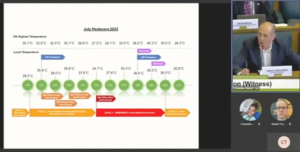Blog written by Kate Swindells of HEART Community Group
At the end of November, Hertfordshire County Council held a one-day topic group marking the anniversary of COP 26. The purpose was to scrutinise the preparedness of HCC directorates in responding to changing climates and how service users access them in this changing environment, especially the more vulnerable members of our community.
One of the four ‘Lead’ ambitions of the Sustainable Hertfordshire Strategy is for “All operations and services to be ready for future climates.”
The meeting proved that HCC is recognising and beginning to take climate impacts seriously, although of course there is a long way to go. There was even a nod towards recognising that we cannot carry on the way we are going, with the challenging key line of enquiry being:
“How will climate adaptation transform business-as-usual practices across the county council service areas?”
Highlights of the meeting (including what time in the recording to tune into):
- WSP’s presentation of their workshops and creation of an HCC-specific climate change risk assessment (29:28:00).
- The Environment Agency’s and HCC Highways’ admissions that:
- “We’re never going to be able to solve the problem of flooding. We’re never going to be able to protect everyone.” (58:36:00)
- “Pipework underground isn’t big enough to cope with the volume of water that’s now happening in short spaces of time…It would be an eye-wateringly large amount of water to replace all the pipework…Unfortunately we all have to get used to more surface water, and more localised flooding at times. There isn’t a simple solution.” (2:05:51)
- Work is underway to assess HCC school and non-school properties, with Heat Decarbonisation Plans and work towards prioritising which properties to retro-fit. (2:38:00)
- Following the WSP workshops, an HCC-specific and highly co-ordinated Extreme Weather Action Plan “Action Cards” was produced, just in time for the summer heatwaves. Without it, it would have been difficult to get to the level of preparedness the Resilience Team did in time for the summer’s heatwaves. (2:47:10)
- The public health team are all too aware of the threat climate change is to health. E.g.
- Heat
- Skin cancer
- Seasonal water-borne disease (in heat and in floods)
- Drought and water supply
- Invasive species: fauna eg Oak precessionary moth, mosquitos as well as flora
- Diseases prevalent in Southern European zones now seen here
- Air quality
- Mental health (especially children)
- “These are the headline dashboard things I look at, and they’re all flashing red.”
- In the Conclusions & Recommendations it was recognised that: (3:57:00)
- There are funding constraints for implementing adaptation measures and that there might be a need for lobbying of central government to meet that financial shortfall.
- Risk assessment high priorities include the impact of climate change on communications.
- “This was a first broad brush dip into this area.”
- “I was very encouraged by today and how much is being done and the recognition of where the gaps are.”
- Lots more topics to cover in future, including migration and mental health (both touched upon from 3:37:21), and going into more depth on the topics covered.
- An ambition to revisit the Topic Group on a regular basis (perhaps every two years)
Overall, we felt this was an excellent start to HCC’s response to baked-in climate impacts, and likely worse impacts to come. We were heartened especially by the Resilience Team’s work to strengthen the responses to extreme weather impacts.
We did feel however that the Topic Group had an over-reliance on using the Met Office UK climate projections, which means (as the UK Climate Change Committee now highlights):
- We may not be focussing enough on overseas climate-related risks including food security, supply chains, migration and unrest.
- We are not fully taking into account high-impact, low probability events or cascading risks.
The documents that accompany this Topic Group, including Appendix A The Climate Change Risk Assessment) can be found here:
https://democracy.hertfordshire.gov.uk/ieListDocuments.aspx?CId=1413&MID=5070#AI6961

The recording is here: (This unfortunately is not great quality, with audio, visual and subtitles out of sync.)
https://aisapps.sonicfoundry.com/AuditelScheduler/Player/Index/?id=0078e707-b8ea-4a18-b8a4-4b425d7cef84&presID=c419da0436d54df3944797bbac2e6f731d

